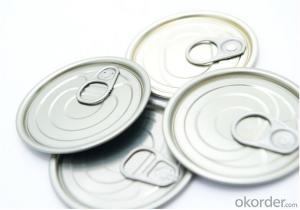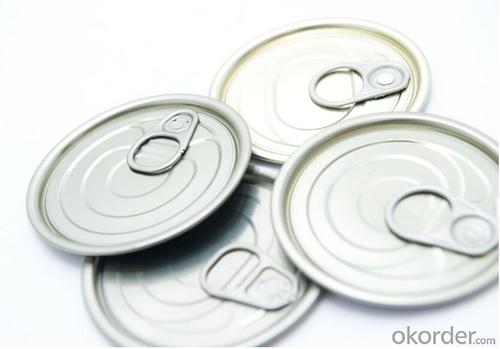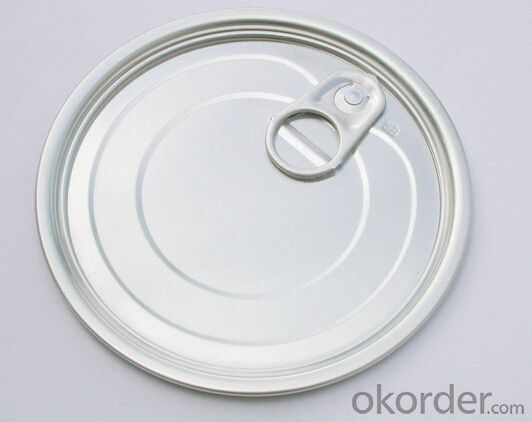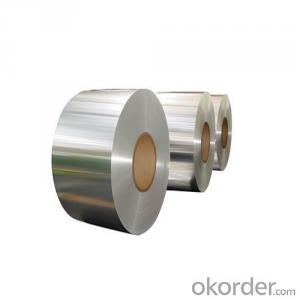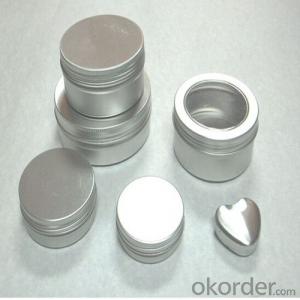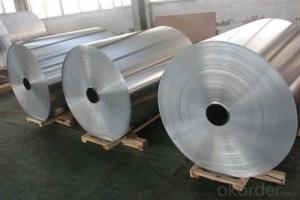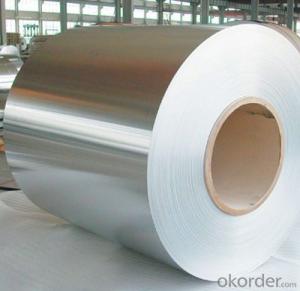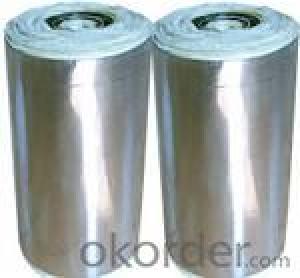Aslcoa Aluminum Coil Easy Open End Can with Best Price
- Loading Port:
- Shanghai
- Payment Terms:
- TT OR LC
- Min Order Qty:
- 100000 m.t.
- Supply Capability:
- 1000000 m.t./month
OKorder Service Pledge
OKorder Financial Service
You Might Also Like
1.Structure of Aluminium Easy Open End Can Description:
Aluminium Easy Open End Can can be used for aluminum can which is a container for packaging made primarily of aluminum (BrE aluminium).It is commonly used for foods and beverages but also for products such as oil, chemicals, and other liquids.Most aluminum cans are made of two pieces. The bottom and body are "drawn" or "drawn and ironed" from a flat plate or shallow cup. After filling, the can "end" is sealed onto the top of the can. Aluminum cans are often made with recycled aluminum; approximately 68% of a standard North American can is recycled aluminum.
2.Main Features of the Aluminium Easy Open End Can:
Durable and long lasting use
Advanced and Elegante beverage and juice packing
Recyclable .
Environment friendly
3.Aluminium Easy Open End Can Image:
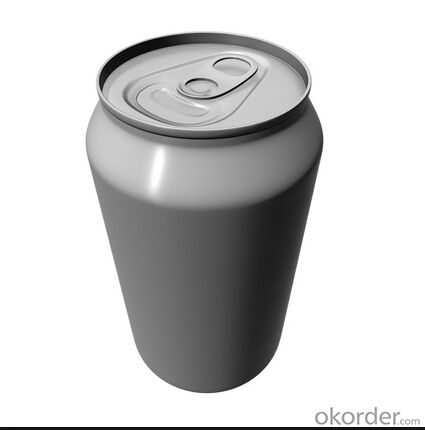
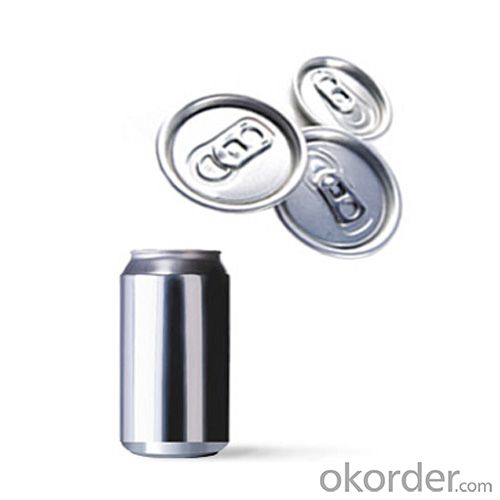
4.Aluminium Easy Open End Can Specification:
Name | easy open end can |
Item No. | 307 # |
Shape/type | Round |
Size(mm) | Dia 83.3 |
Coating | Clear inside & outside |
Material | Aluminum |
Pcs/20 GP’ | 1,500,000 Customize packing: as clients’ requests. |
Features | 1.Have saferim. 2.Used for packaging of dry cargo,such as milk powder,coffe powder,condiment,tea,walnat meat,chicken essence,etc. 3.Have embossed illustration. 4.Coating can be according to customer required. |
5.FAQ:
1) How about your quality?
Quality is priority! Every worker keeps the QC from the very beginning to the very end, Quality control department especially responsible for quality checking in each process.
2) How about the delievery time?
About 30-45 days
3) What is your payment terms?
TT or LC
- Q: How do aluminum coils contribute to reduced material waste?
- Aluminum coils contribute to reduced material waste in several ways. Firstly, aluminum is a highly recyclable material, meaning that it can be melted down and reused multiple times without losing its properties. This recyclability factor alone contributes to reducing material waste as it prevents the need for new aluminum extraction and production. Additionally, aluminum coils are often used in industries where precision and efficiency are crucial, such as in the manufacturing of automobiles, HVAC systems, and electrical equipment. These coils can be easily customized to meet specific requirements, minimizing the need for excess material and reducing waste. Furthermore, aluminum coils offer high strength-to-weight ratio, meaning that they can be manufactured using less material while still maintaining the desired strength and durability. This lightweight characteristic contributes to reduced material waste as it allows for more efficient transportation and installation processes, resulting in lower fuel consumption and less environmental impact. Moreover, aluminum coils can be designed for longer lifespan and improved corrosion resistance. This durability factor helps to minimize the frequency of replacement, reducing material waste over time. Additionally, the long lifespan of aluminum coils makes them an attractive choice for sustainable construction practices, further contributing to reduced waste in the long run. Overall, the use of aluminum coils in various industries not only promotes recycling and reusability but also enables efficient customization, lightweight construction, enhanced durability, and extended lifespan. These factors collectively contribute to reducing material waste and making aluminum coils an environmentally-friendly choice.
- Q: Are the currently rentable U-Haul trailers or trucks made out of aluminum or fiberglass? Thanks!
- anodized aluminum(its hardened aluminum). I dont think anything that u-haul has is fiberglass other than the bigger trucks the hoods are fiberglass cause they would be so heavy is they were metal. let me pull my 6,000 lb truck on this fiberglass trailer that would not work to well.
- Q: Can aluminum coils be used in the production of cryogenic storage tanks?
- Yes, aluminum coils can be used in the production of cryogenic storage tanks. Aluminum is a suitable material for cryogenic applications due to its low density, high thermal conductivity, and excellent corrosion resistance. These properties make it ideal for storing and transporting cryogenic liquids such as liquid nitrogen, oxygen, and argon. Aluminum coils can be used to fabricate the inner shell of the storage tank, providing a lightweight and durable solution. Additionally, aluminum is easily formable, allowing for the creation of complex tank shapes and designs. However, it is important to note that aluminum has a higher coefficient of thermal expansion compared to other materials like stainless steel, so proper design considerations must be taken to accommodate for thermal contraction and expansion during cryogenic operations.
- Q: How to use aluminum sheet to roll a 12m-long aluminum coil with a diameter of 184cm?
- According to project experience, first you should check the specification of the aluminum sheet and then design crafts such as connection method, installation and transportation according to equipment.
- Q: What is the reason for the grooves that go around the circumference of a tin/aluminium can? It can't be for grip because they're covered with paper anyway and i don't think it would make much difference.
- Strength.
- Q: Why does the heat preservation aluminum roll bend when it is cooled?
- Insulation aluminum coil will appear when the cooling bending phenomenon, reason is generally under the conditions of air cooling, the heat transfer coefficient of the aluminum coil insulation parts in contact with the air were flat, but because the wall thickness or different shapes, different parts of the heat dissipation rate is not balanced, resulting in thick wall or hollow tube heat faster than the thin Department of slow, resulting in insulating aluminum roll cooling occurs to the hollow part or thick walled parts of the twists and turns of the phenomenon.
- Q: This question asks for the method to calculate the weight of an aluminum coil given its size.
- <p>To calculate the weight of an aluminum coil, you need to know its dimensions and the density of aluminum. The formula to calculate the weight is: Weight = Volume 脳 Density. First, determine the volume of the coil by multiplying its length (L), width (W), and thickness (T): Volume = L 脳 W 脳 T. The density of aluminum is approximately 2.7 grams per cubic centimeter (g/cm鲁). Convert the volume to cubic centimeters if it's not already. Then, multiply the volume by the density to get the weight in grams. To convert grams to kilograms, divide by 1000. This will give you the weight of the aluminum coil.</p>
- Q: What is the expected lead time for manufacturing aluminum coils?
- The expected lead time for manufacturing aluminum coils can vary depending on the complexity of the order, the quantity needed, and the production capacity of the manufacturer. Generally, it can range from a few weeks to a couple of months.
- Q: What are the different color options for anodized aluminum coils?
- The different color options for anodized aluminum coils include silver, gold, bronze, black, blue, red, green, and various shades of gray.
- Q: What are the different available coil weights for aluminum coils?
- The different available coil weights for aluminum coils can vary depending on the specific manufacturer and application requirements. However, common coil weights for aluminum coils range from a few hundred pounds to several thousand pounds.
Send your message to us
Aslcoa Aluminum Coil Easy Open End Can with Best Price
- Loading Port:
- Shanghai
- Payment Terms:
- TT OR LC
- Min Order Qty:
- 100000 m.t.
- Supply Capability:
- 1000000 m.t./month
OKorder Service Pledge
OKorder Financial Service
Similar products
Hot products
Hot Searches
Related keywords
